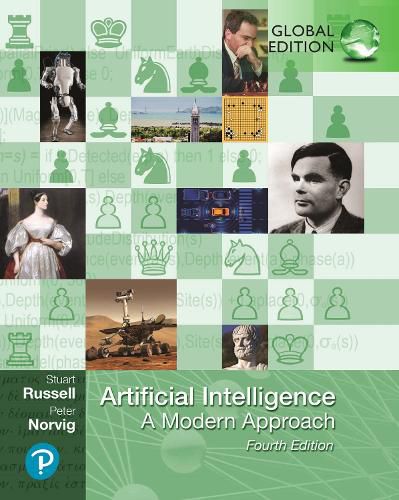Readings Newsletter
Become a Readings Member to make your shopping experience even easier.
Sign in or sign up for free!
You’re not far away from qualifying for FREE standard shipping within Australia
You’ve qualified for FREE standard shipping within Australia
The cart is loading…






The long-anticipated revision of Artificial Intelligence: A Modern Approach explores the full breadth and depth of the field of artificial intelligence (AI). The 4th Edition brings readers up-to-date on the latest technologies, presents concepts in a more unified manner, and offers new or expanded coverage of machine learning, deep learning, transfer learning, multi agent systems, robotics, natural language processing, causality, probabilistic programming, privacy, fairness, and safe AI. Features Offers the most comprehensive and accessible introduction to the theory and practice of AI
In-depth coverage of both basic and advanced topics provides students with a basic understanding of the discipline without compromising complexity and depth. Non-technical learning material makes content more accessible, introducing major concepts before going into mathematical algorithmic details.
Teach up-to-date material in a more unified manner according to latest technologies
Unified approach to AI showcases how the various sub-fields of AI fit together. Flexible format offers adaptable text for varying instructors’ preferences. A comprehensive index and extensive bibliography support student learning, covering a wide range of topics relevant to the content.
New to this edition
New chapters feature expanded coverage of probabilistic programming (Ch. 18); multi-agent decision making (Ch. 17 with Michael Wooldridge); deep learning (Ch.22 with Ian Goodfellow); and deep learning for natural language processing (Ch. 25 with Jacob Devlin and Mei-Wing Chang). Significantly updated material on robotics includes robots that interact with humans and the application of reinforcement learning to robotics. Revised coverage of computer vision, natural language understanding, and speech recognition reflects the impact of deep learning methods on these fields. New sections include content on topics, such as causality by Judea Pearl, and the Monte Carlo search for games and robotics. New sections discuss transfer learning for deep learning in general and for natural language. New sections include content on privacy, fairness, future of work, and safe AI.
$9.00 standard shipping within Australia
FREE standard shipping within Australia for orders over $100.00
Express & International shipping calculated at checkout
Stock availability can be subject to change without notice. We recommend calling the shop or contacting our online team to check availability of low stock items. Please see our Shopping Online page for more details.
The long-anticipated revision of Artificial Intelligence: A Modern Approach explores the full breadth and depth of the field of artificial intelligence (AI). The 4th Edition brings readers up-to-date on the latest technologies, presents concepts in a more unified manner, and offers new or expanded coverage of machine learning, deep learning, transfer learning, multi agent systems, robotics, natural language processing, causality, probabilistic programming, privacy, fairness, and safe AI. Features Offers the most comprehensive and accessible introduction to the theory and practice of AI
In-depth coverage of both basic and advanced topics provides students with a basic understanding of the discipline without compromising complexity and depth. Non-technical learning material makes content more accessible, introducing major concepts before going into mathematical algorithmic details.
Teach up-to-date material in a more unified manner according to latest technologies
Unified approach to AI showcases how the various sub-fields of AI fit together. Flexible format offers adaptable text for varying instructors’ preferences. A comprehensive index and extensive bibliography support student learning, covering a wide range of topics relevant to the content.
New to this edition
New chapters feature expanded coverage of probabilistic programming (Ch. 18); multi-agent decision making (Ch. 17 with Michael Wooldridge); deep learning (Ch.22 with Ian Goodfellow); and deep learning for natural language processing (Ch. 25 with Jacob Devlin and Mei-Wing Chang). Significantly updated material on robotics includes robots that interact with humans and the application of reinforcement learning to robotics. Revised coverage of computer vision, natural language understanding, and speech recognition reflects the impact of deep learning methods on these fields. New sections include content on topics, such as causality by Judea Pearl, and the Monte Carlo search for games and robotics. New sections discuss transfer learning for deep learning in general and for natural language. New sections include content on privacy, fairness, future of work, and safe AI.